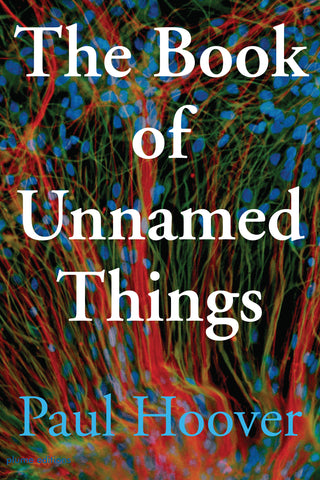The Book of Unnamed Things by Paul Hoover
Paul Hoover’s new book is a lush exercise in antiphonal parallelisms, a call-and-response of flesh, speech, and world. The accumulation of debts and releases is mapped elegantly onto the reversible cloth of the spoken and unspoken, the written versus the unwritten (and in between, the handwritten, that prodigal alibi). The dialogue here is not so much with ghosts as with the idea of ghosts, the shadows cast in the mind by sensual and philosophical inquiry. “Words unspoken / remain forever old,” Hoover asserts. The quiet power of this collection inheres in the accrual of experience, ever-exfoliating and opening continuously into a plain of juxtaposed signification: “the doors are wide open / all is context now.”
—G.C. Waldrep
At the core of Paul Hoover’s distinguished body of work is the oldest and perhaps most thrilling value in poetry: entertainment.… Book after book, Paul Hoover has made contemporary poetics common and useful as clouds and sunlight. For Hoover, poetics put into practice makes writing a model for the processes of reality.… How does he manage to make his poems so keenly intelligent, so philosophically engaging, so extremely entertaining?
—Gillian Conoley
Hoover’s concern with language’s representational inadequacy is shared by the L=A=N=G=U=A=G=E poets he’s championed for years.… However, his own poems are more direct, more lyrical, and sometimes seethingly and seductively melancholic. Central to all of them (regardless of language’s irrefutable limitations) is his keen intelligence and laconic wit.
—Mary Jo Bang
This [Desolation: Souvenir] is the most beautiful meditative voice I have heard since Eliot’s Four Quartets. Like Eliot, Hoover displays a stunning compression of ideas that open over time as the mind’s own flowers.
—David Mutschlecner
—G.C. Waldrep
At the core of Paul Hoover’s distinguished body of work is the oldest and perhaps most thrilling value in poetry: entertainment.… Book after book, Paul Hoover has made contemporary poetics common and useful as clouds and sunlight. For Hoover, poetics put into practice makes writing a model for the processes of reality.… How does he manage to make his poems so keenly intelligent, so philosophically engaging, so extremely entertaining?
—Gillian Conoley
Hoover’s concern with language’s representational inadequacy is shared by the L=A=N=G=U=A=G=E poets he’s championed for years.… However, his own poems are more direct, more lyrical, and sometimes seethingly and seductively melancholic. Central to all of them (regardless of language’s irrefutable limitations) is his keen intelligence and laconic wit.
—Mary Jo Bang
This [Desolation: Souvenir] is the most beautiful meditative voice I have heard since Eliot’s Four Quartets. Like Eliot, Hoover displays a stunning compression of ideas that open over time as the mind’s own flowers.
—David Mutschlecner
Paperback: 84 pp.
Publisher: Madhat, Inc. (March 1, 2018)
Language: English
ISBN-13: 978-1-941196-60-1






